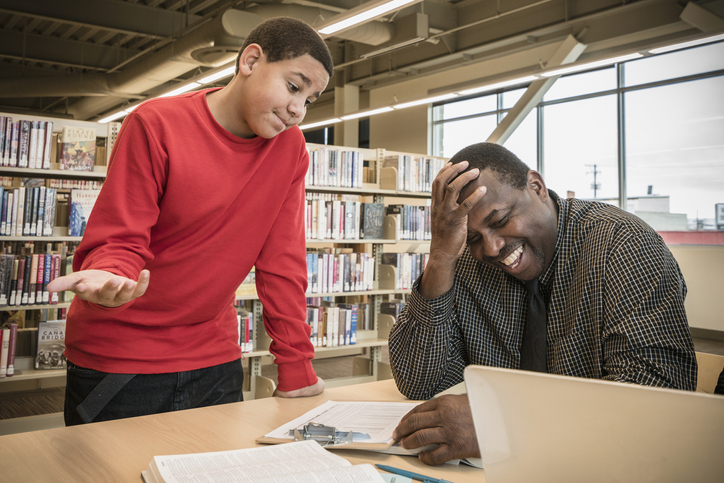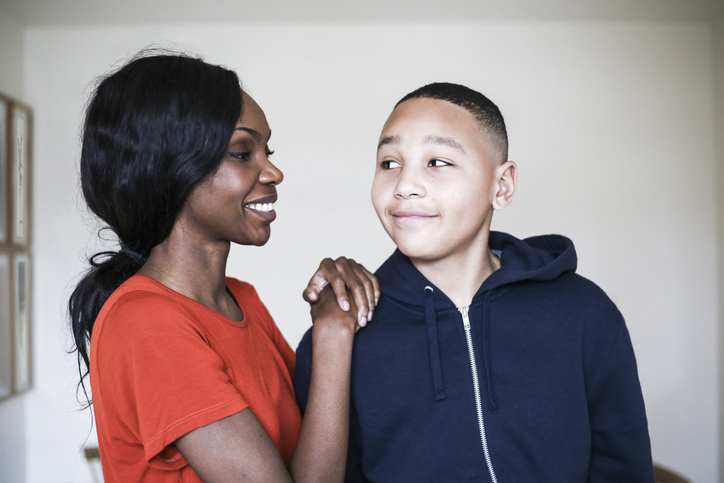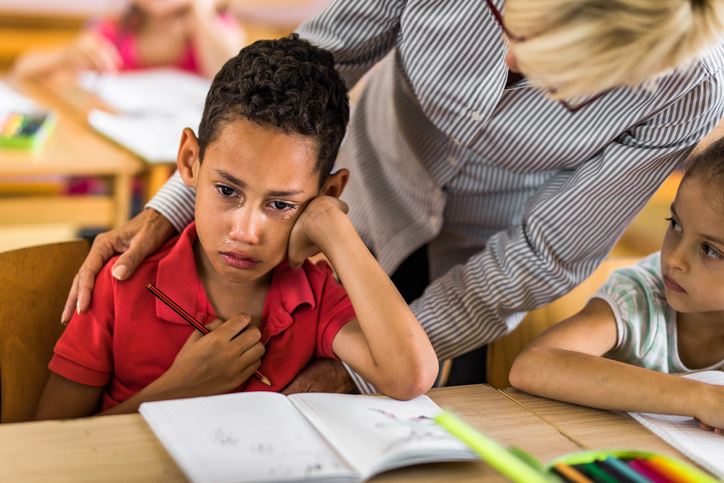5 Common Reasons Your Kid Is Acting Out In School And What To Do About It - Page 9
Share the post
Share this link via
Or copy link

Source: LumiNola / Getty
Prior to teaching middle school, I had a very simplistic outlook on children who misbehave in school. I believed that children act out because they want to and that the best approach to correcting unwanted behavior is discipline. However, after spending a few years in the classroom, I quickly began to recognize that while there are situations when students act out just because they feel like it, children misbehave for a variety of reasons. More often than not, the misbehavior is a symptom of a larger problem and by treating the symptom without getting to the root of the issue, things will likely only get worse. Here are six common reasons that children misbehave in school and practical solutions to help get them back on track.
Undiagnosed or unaddressed learning disability
A big reason that children act out in school is that they’re suffering from a learning disability that is either undiagnosed or that is going unaddressed. Children with learning disabilities are entitled to special accommodations and differentiation in instruction.

Source: SDI Productions / Getty
Solution: Request an evaluation
If you suspect that your child has a learning disability, reach out to the special education coordinator and let them know that you have concerns and would like to have your student evaluated. Additionally, if your child has already been diagnosed with a learning disability, you should review their Individualized Education Plan to find out what accommodations they’re entitled to and then find out if these accommodations are actually being administered in the classroom.

Source: Hill Street Studios / Getty
Desire for attention
Love MadameNoire? Get more! Join the MadameNoire Newsletter
We care about your data. See our privacy policy.
Sometimes when children aren’t getting enough attention at home, they act out. To them, it doesn’t really matter whether the attention they receive is positive or negative. As a result, they may act out in school.

Source: Maskot / Getty
Solution: One-on-one time and positive reinforcement
We sometimes spend so much time working to provide for and take care of our children that we forget to spend meaningful time with them. If you suspect that your child may be acting out in school as a means of getting attention, carve out some time in your schedule where you can spend some one-on-one time that is free from distractions such as electronic devices and younger siblings. Additionally, you can use positive reinforcement to praise and highlight positive behaviors.

Source: JGI/Jamie Grill / Getty
Problems at home
Stressors of home life can also contribute to undesirable behavior in the classroom. If you have been receiving negative reports and your family is going through a particularly challenging time such as a divorce or the death of a loved one, there may be a connection.

Source: SDI Productions / Getty
Solution: Family therapy
Sometimes, children don’t know how to work through negative feelings and need help talking through them. Family therapy is a great resource to give your child the tools and coping mechanisms needed to work through grief and other challenging life experiences.

Source: Maskot / Getty
Wanting to impress their friends
Unfortunately, children often give in to peer pressure and misbehave at school and other social settings in order to impress their peers. We’ve all been there a time or two but when it becomes a chronic issue, it needs to be addressed.

Source: kali9 / Getty
Solution: Tough love
When your child feels that they have to resort to negative behaviors in order to win people over, it’s a problematic mindset that they must be broken out of because it can cause them many problems if carried into adulthood. For some children, a logical heart-to-heart conversation about what true friendship looks like is all it takes. For others, tough love such as punishment or other consequences should be issued. The goal is to make the consequence a teachable moment. Doing bad things to impress others may feel good at the moment, but more often than not, when you have to suffer the consequences of those actions, none of those people will be around to help you. This is also a great time to build up your child’s self-esteem and teach them about not seeking validation from others.

Source: skynesher / Getty
Struggling with the content
Sometimes, children misbehave in class because they’re frustrated and struggling to understand the content being taught. Children don’t always know how to advocate for themselves in educational settings. If you’ve noticed an uptick in negative behavior and a decline in your child’s grades, it’s possible that the poor grades are causing the misbehavior and not vice versa.

Source: SDI Productions / Getty
Solution: Additional support
If your child is struggling in school, additional support is required. The first step would be to reach out to their teacher to communicate that you have noticed he or she is struggling and see what supports are offered by the school. Many schools offer extra help tutoring in the mornings or afternoons. Additionally, setting aside time at home so that you can help with homework is also useful. If you find that your child is in need of intensive intervention, hiring a tutor may be the best approach.
-

Meet Dominique Fils-Aimé, The Haitian-Canadian Star Redefining Jazz For A New Generation: ‘This is My Vision' [Exclusive]
-

Cooking With Purpose — How Brittney Williams Honors Her Caribbean Roots Through Food
-

9 Famous Lesbian Women Who Were Married To Men
-

Be Rooted: How Jasmin Foster Built A Lifestyle Brand For Black Women, By Black Women








